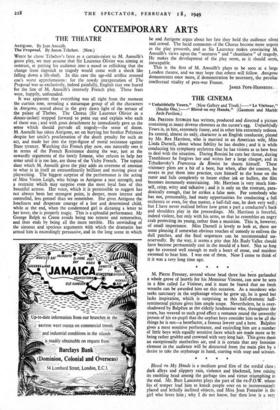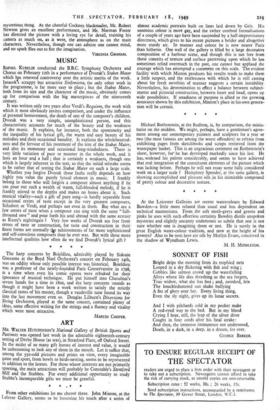THE CINEMA
" Unfaithfully Yours." (New Gallery and Tivoli.)--" Le Visiteur." (Studio One.)—" Blood on my Hands." (Gaumont and Marble Arch Pavilion.)
MR. PRESTON STURGES has written, produced and directed a picture containing as many diverse elements as the curate's egg. Unfaithfully Yours is, in bits, extremely funny, and in other bits extremely tedious. Its central, almost its only, character is an English conductor, played by Mr. Rex Harrison, who is married to an American wife, Miss Linda Darnell, about whose fidelity he has doubts ; and it is while conducting his symphony orchestra that he has visions as to how best to deal with the situation. During Rossini he cuts her throat, during Tannhauser he forgives her and writes her a large cheque, and in Tchaikovsky's Francesca da Rimini he shoots himself. These visionary plots are a bit of a bore, but when, after the concert, he essays to put them into practice, cuts himself to the bone on the razor and fails completely to locate either ink or bullets, the film becomes immensely entertaining. Mr. Harrison is very much him- self, crisp, witty and talkative ; and it is only on the rostrum, para- doxically enough, that he strikes a false note. For somebody who has not, presumably, had many opportunities for conducting a full orchestra or even, for that matter, a half-full one, he doet very well ; but I have never realised before how great a part a conductor's back and shoulders play in the proceedings. Mr. Harrison is forceful, indeed violent, but only with his arms, so that he resembles an angry crab protecting its young, rather than a musician. This is, however, of small importance. Miss Darnell is lovely to look at, there are some pleasing if somewhat obvious touches of comedy to enliven the dull patches, and the final sequences can be recommended un- reservedly. By the way, it seems a pity that Mr. Rudy Vallee should have become permanently cast in the mould of a bore. Not so long ago he crooned well enough to melt a heart of stone, and maidens swooned to hear him. I was one of them. Now I come to think of it it was a very long time ago.
* *. * * M. Pierre Fresnay, around whose head there has been garlanded a whole grove of laurels for his Monsieur Vincent, can now be seen in a film called Le Visiteur, and it must be feared that no fresh wreaths can be awarded him on this occasion. As a murderer who seeks sanctuary in the orphanage where he grew up, he is good but lacks inspiration, which is surprising as this half-dramatic half- sentimental picture gives him ample scope. Nevertheless, he is over- shadowed by Balpetre as the elderly headmaster who, throughout the years, has weaved to such good effect a romance round the unworthy person of his ex-pupil that the orphan boys consider him to be all the things he is not—a benefactor, a famous lawyer and a hero. Balpetre gives a most sensitive performance, and encircling him are a number of little boys with equally sensitive faces which are made more so by being rather grubby and crowned with very long hair. This gives them an exceptionally motherless air, and it is certain that any feminine element in the audience will be distracted from the main plot by a desire to take the orphanage in hand, starting with soap and scissors.
* * * *
Blood on My Hands is a medium good film of the sordid class ; dark alleys and slippery rain, violence and blackmail, love raising its enobling head among the garbage tins and virtue triumphing in the end. Mr. Burt Lancaster plays the part of the ex-P.O.W. whose fits of temper lead him to knock people over on to inconveniently placed and lethally inclined objects, and Miss Joan Fontaine is the girl who loves him ; why I do not know, but then love is a very mysterious thing. As the cheerful Cockney blackmailer, Mr. Robert Newton gives an excellent performance, and Mr. Norman Foster has directed the picture with a loving eye for detail, training his camera as much on, as it were, the atmosphere as on the main characters. Nevertheless, though one can admire one cannot mind, and no spark flies out to fire the imagination.
VIRGINIA GRAHAM.







































 Previous page
Previous page